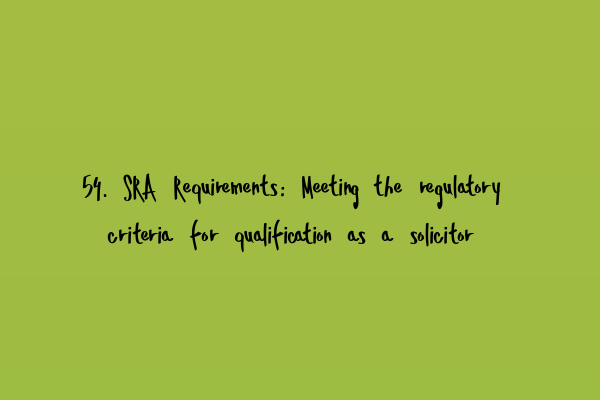54. SRA Requirements: Meeting the regulatory criteria for qualification as a solicitor
Becoming a qualified solicitor in the UK requires meeting certain criteria set by the Solicitors Regulation Authority (SRA). These regulatory requirements ensure that solicitors possess the necessary skills, knowledge, and professionalism to provide legal services effectively.
In this article, we will explore the SRA requirements for qualifying as a solicitor and how you can meet them. Whether you’re a law graduate or considering a career switch to law, understanding these requirements is crucial for your journey towards becoming a solicitor.
1. Qualifying Law Degree (QLD)
The first step to becoming a solicitor is obtaining a Qualifying Law Degree (QLD). The SRA requires candidates to have an undergraduate degree in law or a conversion course (Graduate Diploma in Law) approved by the SRA.
The QLD ensures that you have a solid understanding of legal principles and concepts. It covers various areas of law, including contract law, criminal law, equity, and trusts. Taking your studies seriously during your QLD will help lay a strong foundation for your legal career.
It is important to note that the SRA has specific requirements for QLDs, such as the number of core modules and the level of academic achievement. Be sure to research and select a QLD program that meets these criteria to avoid unnecessary complications later on.
2. Legal Practice Course (LPC)
After completing your QLD, the next step is to undertake the Legal Practice Course (LPC). The LPC is a practical training course that focuses on developing the skills necessary for legal practice.
During the LPC, you will learn essential skills such as legal research, drafting, advocacy, and client interviewing. You will also have the opportunity to choose elective modules based on your areas of interest, such as commercial law, family law, or dispute resolution.
It is important to choose an LPC provider that is approved by the SRA and offers a high-quality program. This will ensure that you receive the best possible training and preparation for your future legal career.
3. Period of Recognised Training (Training Contract)
One of the most crucial SRA requirements is completing a Period of Recognised Training, commonly known as a training contract. This allows you to gain practical experience under the supervision of qualified solicitors.
During your training contract, you will work in a law firm or an approved legal environment. This hands-on experience will enable you to apply your legal knowledge in real-life situations, develop practical skills, and gain insight into different areas of law.
A training contract typically lasts for two years, during which you will be exposed to a variety of legal work, interact with clients, and collaborate with colleagues. It is essential to secure a training contract with a reputable firm or organization to maximize your learning opportunities.
4. Professional Skills Course (PSC)
Upon completing your Period of Recognised Training, you will need to undertake the Professional Skills Course (PSC). The PSC focuses on developing the essential skills required for practice as a solicitor, such as financial and business skills, advocacy, and client care.
The PSC provides you with the necessary knowledge and skills to handle day-to-day legal tasks effectively, ensuring you are well-prepared to enter the legal profession.
5. Character and Suitability
In addition to the educational and practical requirements mentioned above, the SRA also assesses your character and suitability to become a solicitor. This includes evaluating your criminal record, financial standing, and any disciplinary or regulatory issues.
It is crucial to maintain a good character and ensure your actions align with the SRA’s standards of professionalism and ethics. Any issues or disclosures relating to character and suitability should be dealt with transparently and appropriately to demonstrate your commitment to upholding these principles.
Conclusion
Meeting the regulatory criteria set by the SRA is essential for qualifying as a solicitor in the UK. The requirements include obtaining a Qualifying Law Degree, completing the Legal Practice Course, undertaking a Period of Recognised Training, and passing the Professional Skills Course.
Additionally, maintaining a good character and suitability is vital for entering the legal profession. By fulfilling these requirements, you will be well on your way to becoming a qualified solicitor and embarking on a rewarding legal career.
For more guidance and preparation resources for the SQE exams, check out these related articles:
Conquer the Multiple Choice Questions (MCQ) in SQE1
Interactive mock tests for SQE: Enhancing engagement and learning
SQE Sample Papers: Practice for Exam Success
